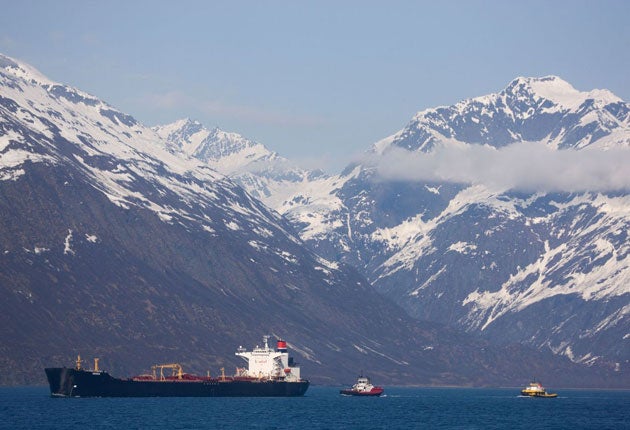
Your support helps us to tell the story
From reproductive rights to climate change to Big Tech, The Independent is on the ground when the story is developing. Whether it's investigating the financials of Elon Musk's pro-Trump PAC or producing our latest documentary, 'The A Word', which shines a light on the American women fighting for reproductive rights, we know how important it is to parse out the facts from the messaging.
At such a critical moment in US history, we need reporters on the ground. Your donation allows us to keep sending journalists to speak to both sides of the story.
The Independent is trusted by Americans across the entire political spectrum. And unlike many other quality news outlets, we choose not to lock Americans out of our reporting and analysis with paywalls. We believe quality journalism should be available to everyone, paid for by those who can afford it.
Your support makes all the difference.The keys to vast reserves of oil off the coast of Alaska may have been handed to Shell this week after President Barack Obama's administration granted it provisional permission to drill exploration wells in the Beaufort Sea's frigid waters despite fierce opposition from environmentalists.
"This is a disaster waiting to happen," said Holly Harris, a lawyer for Earthjustice, one of several groups decrying the approval by the Bureau of Ocean Energy Management, Regulation and Enforcement of Shell's drilling plans for the region off the northern edge of Alaska. "Today's decision is nothing more than the administration's decision to roll the dice with the Arctic."
Shell's plans to drill in the Atlantic Arctic were well advanced when the BP disaster struck in the Gulf of Mexico last year and all ocean-drilling projects in US waters were effectively put on hold. The energy giant must still secure a bevy of sub-permits to be able to meet its goal of starting drilling next summer.
This "is welcome news", Shell spokeswoman Kelly op de Weegh said. "We look forward to continued progress as we pursue the permits necessary to drill." Pete Slaiby, a Shell vice-president in Alaska, added: "We feel very good about it. It's one of the road marks we wanted to see. It makes us very happy."
Shell, the Anglo-Dutch energy giant, is the canary in the mine when it comes to the Beaufort Sea and the adjacent Chukchi Sea, where it also wants to drill. If it can successfully tap a reserve that geologists believe would be the second-largest in the US after the Gulf of Mexico, other companies, such as Exxon and ConocoPhillips, would quickly move in and a new oil rush would be under way.
While the wells it proposes in Alaska will be in waters far shallower than those beneath BP's doomed Deepwater Horizon rig in the Gulf of Mexico, there are other factors that make exploration in the Beaufort Sea perilous, not least high winds and marauding icebergs. Like the Gulf, the waters are rich with biodiversity. And a spill would be much harder to tackle because of the cold water temperatures. It was partly the warmth of the Gulf waters that helped to disperse the BP spill more quickly than expected.
But Rebecca Noblin, the Alaska director for the Centre for Biological Diversity, said the approval for Shell was proof that the "promises of reform after the Deepwater Horizon [accident] amount to nothing. This administration is as willing as ever to rubber-stamp dangerous drilling plans in the Arctic Ocean." She noted that the nearest Coast Guard station was more than 1,000 miles from where Shell planned to drill.
Join our commenting forum
Join thought-provoking conversations, follow other Independent readers and see their replies
Comments